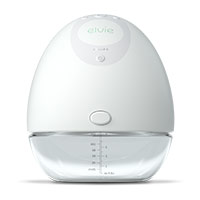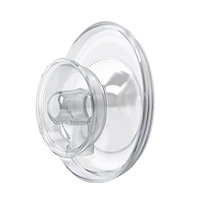Why is my baby making noises while they sleep?
In a word; biology. Newborns are in a constant, rapid state of growth. In the first few months of life, your baby will put on roughly 28g of weight per day — quite a lot for someone so tiny! And because their body is still very much under construction, this can cause all sorts of nighttime noisiness. Some of the biological factors influencing your baby’s bedtime babble include:
Hunger. Lip-smacking, suckling, and rooting noises all indicate a hungry baby. If they’re making these sounds, try a little preemptive feeding session — because let’s face it, who doesn’t love being woken up from a nap with a delicious meal?
Sleep transitions. A newborn goes through two distinct sleep stages during the first few months of life. These cycles are referred to as REM (or “active”) sleep and non-REM (or “quiet”) sleep. During their active sleep phases — which account for around 50% of their slumber time — they may stir, resulting in a few groans and squawks.
Bowel movements. Poop — as parents, it’s something we’re well acquainted with. If your baby suddenly starts grunting mid-snooze, we’re afraid to say there’s a strong chance they’re going for a number two. Thankfully, other than the smell, noisy pooping (sometimes referred to as ‘grunting baby syndrome’ or Dyschezia) is usually harmless, though it can be alarming to new parents unfamiliar with the sound.
Physiological development. Because your little one’s digestive and respiratory systems are still developing, they’re under a lot more stress, especially while they’re asleep. This means more naptime noises — think gurgling, moans, and changes in the rhythm of their breaths.
Nose breathing. Until they reach 3-4 months of age, your tot will breathe exclusively through their nose. Given the tiny size of their nasal passages, they can become very easily clogged, which can lead to congestion and sniffling.
Normal baby sleep sounds
As a parent, “Is this normal?” might just be one of your most frequent thoughts — right up there with “Will I ever get to have a full night’s sleep again?” and “What are you crying about now?”.
By way of reassurance, we’ve included a list of some of the most common (completely normal) baby sleep sounds below:
Gurgling
While it might be surprisingly loud, gurging is usually no cause for concern. Babies often gurgle in their sleep because of their underdeveloped swallowing reflexes. As strange as the sounds may be, they’re not a sign of distress — your tot’s just figuring out the art of “saliva management”.
Hiccuping
Objectively adorable to observe, and no cause for concern, hiccups are caused by a diaphragm spasm and are more common in infants because their digestive systems are still developing — you may have even noticed your baby hiccuping in the womb!
Hiccups generally don’t bother babies like they do adults, so if you hear them in the middle of the night, there’s no need to worry. Believe it or not, some babies sleep right through their hiccuping episodes.
Burping or passing gas
Babies tend to swallow lots of air during feeding, and all that trapped gas has to escape at some point — even if they’re fast asleep. The occasional burp or toot is all par for the course while you’re tot’s snoozing. If they seem particularly flatulent though, massaging their tummy with gentle clockwise strokes or “bicycling” their legs can help to relieve any discomfort.
Grunting
Grunting is another common sleep noise — especially if your little one’s entering a new sleep phase, or trying to pass stool. As mentioned earlier, grunting is most commonly associated with digestion.
Believe it or not, we weren’t born with the muscle coordination required to pass stool comfortably; we had to learn how to do it. So, if you hear any grunting, it might just mean your tot’s coming up with the next diaper-based masterpiece. Icky, perhaps, but no cause for concern.
Lip-smacking
Lip-smacking is a natural reflex tied to feeding, so if you hear it during naptime, it might be time to wake your baby up via boob or bottle. It can also be a self-soothing method and is linked to the transitionary period between sleep cycles.
Normal baby breathing sounds
Noticing a change in your baby’s breathing might be unsettling, but it’s worth remembering that babies’ breathing patterns are often irregular. Unlike your fully-formed adult respiratory system, theirs is still developing. So, if you notice any of the following breathing noises, don’t be alarmed — your tot’s just adjusting to life outside the womb.
Fast breathing
Babies breathe much faster than adults — around 40 to 60 times a minute. This rapid breathing is especially noticeable when they’re in theactive sleep phase, while experiencing REM sleep. Provided it isn’t accompanied by wheezing or sudden, sharp intakes of breath, this is usually no cause for concern — but you should always consult a paediatrician if you’re worried.
Rapid breathing can also be caused by:
Transient tachypnea: This condition is common in newborns, particularly those born by C-section. Transient tachypnea occurs when fluid remains in a baby’s lungs after birth, causing rapid breathing (more than 60 breaths per minute) as their lungs work to clear the excess fluid. The good news? It usually resolves within the first day or two of life and doesn’t cause long-term problems. However, if it persists, your doctor may want to monitor your baby’s oxygen levels to ensure they’re breathing comfortably.
Laryngomalacia: This is where the tissues of the baby’s larynx (voice box) are softer than usual, causing them to collapse inward during inhalation. The result is noisy breathing or rapid breathing, especially when lying on their back. Laryngomalacia is the most common cause of noisy breathing in infants and tends to improve as your baby grows and the tissues firm up. In most cases, it’s not dangerous, though it can cause some feeding or breathing difficulties in more severe instances. If you suspect laryngomalacia, your paediatrician can evaluate your baby’s breathing to ensure everything is developing properly.
Pauses in breathing
Brief pauses between breaths might be alarming, but they're perfectly normal. This is referred to as periodic breathing, and it’s not uncommon for pauses to last as long as 10 seconds — frightening, yes, but completely normal. Over time, as your baby’s respiratory system matures, their breathing will become more consistent.
Sighing
Little sleepy sighs are as useful as they are adorable, serving to regulate (and, according to recent research, reset) breathing, and maintain lung function.
Snuffling
As we mentioned earlier, babies are uber-prone to congestion thanks to their teeny tiny nasal passages. If your baby tends to snuffle while sleeping, it’s likely down to nasal congestion. Saline drops can help clear any blockages if they seem to be affecting their ability to stay snoozin’, but the noise itself is typically nothing to be worried about.
Are there any baby sleep sounds to be concerned about?
You’re well-versed in your baby’s sleepytime setlist. You know all the hits — gurgling, gargling, and groaning — but we’re not finished just yet. It’s important to know which sounds are healthy staples of your baby’s nightly symphony, and which ones might indicate something more serious.
Wheezing
If you notice a high-pitched whistling sound while your baby is breathing — especially if it continues over time — it could be a sign of a respiratory issue, allergy, or infection. Around 25-30% of infants will have at least one episode of wheezing, and while it’s usually nothing serious, it’s always best to err on the side of caution and get it checked out by a professional if it’s a recurring issue.
Persistent coughing
The occasional cough or sneeze is usually no cause for concern; but if your tot can’t seem to shake their cough, or it’s accompanied by rapid breathing, this could signal an infection or even whooping cough.
Stridor
This is a harsh, grating sound made while breathing in, usually indicating a blockage or inflammation in the airway. The sound can vary — some parents report it sounding wheezy, while others hear a high-pitched squeak. In any case, it’s worth getting your tot checked out if you suspect stridor, as this condition can occur with conditions like croup, an infection in the upper airway.
Laboured breathing
If you ever notice your baby’s chest sinking in, or their nostrils flaring with each breath, this could be a sign that they’re struggling to breathe, and you should seek medical attention immediately.
Rhythmic grunting
A few grunts here and there are perfectly fine, but consistent, rhythmic grunting — not so much. This could indicate respiratory distress syndrome, and is worth getting checked by a professional.
Extra-long exhales
If you notice that your baby is taking a long time to exhale — even if their breathing seems calm — it could indicate an obstruction in their airway. A delayed or laboured exhale might suggest conditions like bronchiolitis or asthma, so it’s a good idea to contact a doctor if your baby’s exhaling for 2 seconds or longer.
When will my baby stop making so much noise in their sleep?
Some babies begin to sleep more peacefully once they hit the 3-6 month mark, as their sleep cycles stabilise and their digestive and respiratory systems develop, but every baby is different. It’s not unheard of for some children to remain noisy snoozers well into their toddling years — and some even beyond that (if you’ve ever had to deal with a snoring partner, you’ll understand this more than most).
On the plus side, the more you hear your tot’s sleeping noises, the more attuned you’ll become to them. Where in the past you may have felt frantic and fearful whenever your baby let out a peep while asleep, you’ll gradually be able to distinguish between “normal” sounds and noises that might require further investigation.
Hopefully, we’ve allayed any fears you might’ve had over your baby’s naptime noises, but remember: if you’re ever unsure or something doesn’t feel right, there’s never any harm in getting a professional opinion. You know your baby better than anyone else!
Is your baby frequently crying in their sleep? This is pretty normal, too. For peace of mind, check out our guide to the most likely reasons for sleep crying and when you should be concerned.
Reviewed by Rosey Davidson, Sleep Consultant, founder & CEO, in November 2024.











 9 minute read
9 minute read